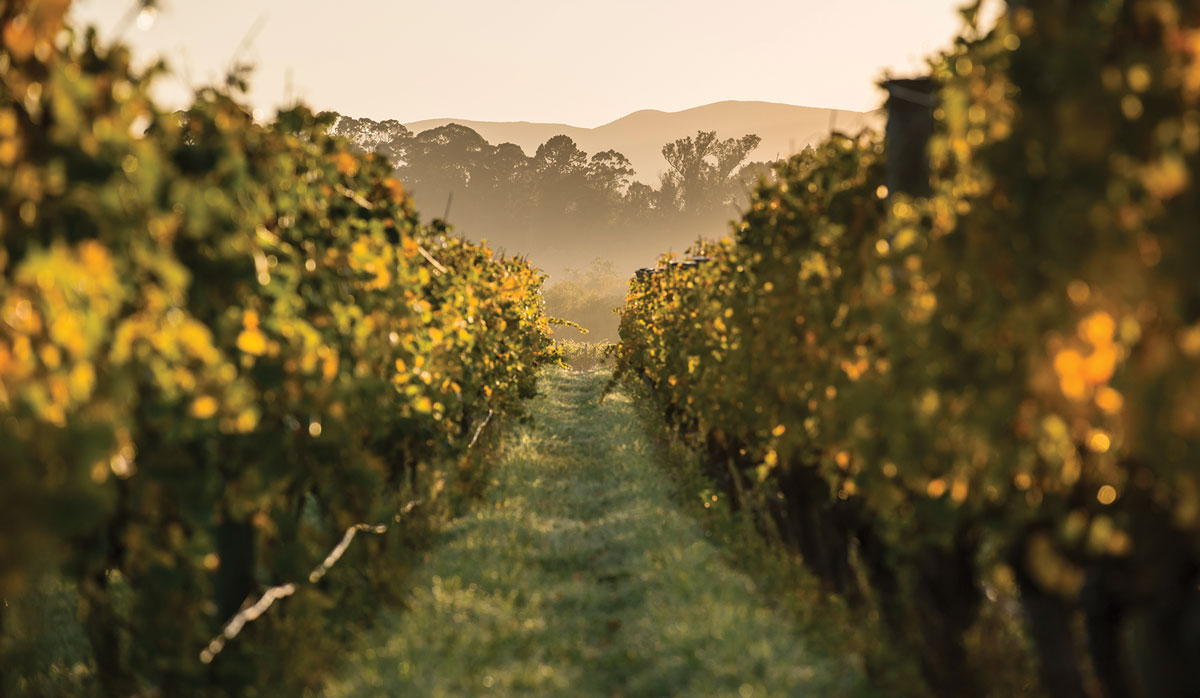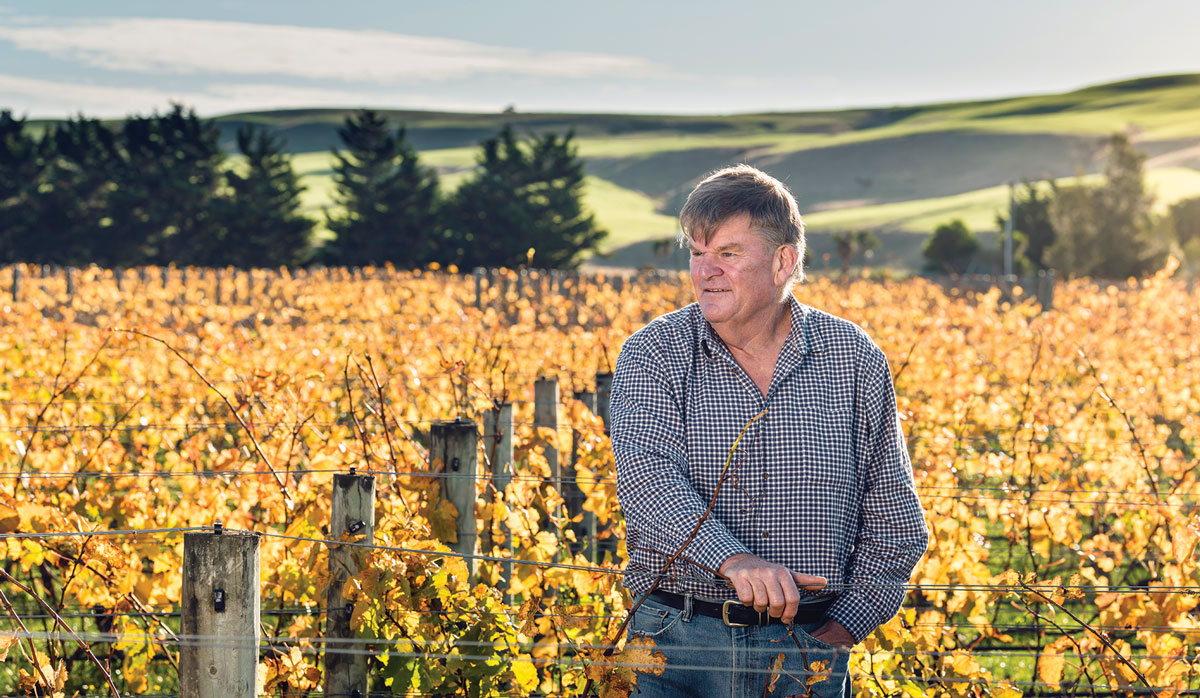Ata Rangi’s Rosé Brut 2023: A fresh dawn in design
Look at a line-up of Ata Rangi wine bottles and you'll see a bold, cheerful interloper amongst the more traditional font-forward labels: the Rosé Brut 2023.
Five 'Pinot Pioneers' have been recognised for their groundbreaking work in Martinborough, helping transform a rural farming community in today's "dynamic and vibrant vine village".
Joelle Thomson takes a look at the influence of soil scientist Derek Milne and winemakers Dr Neil McCallum, Larry McKenna, Clive Patton and Phyll Pattie on the region's reputation.
Clive Paton and Phyll Pattie - Ata Rangi Founders
Clive Paton has lived a highly awarded life for his work in conservation and in wine. The many accolades include a Business Conservation Award in 2007, being made an Officer of the New Zealand Order of Merit in the Queen's Birthday Honours of 2012, winning the Minister of Conservation's Loder Cup in 2012, and being named a Fellow of New Zealand Winegrowers in 2022, along with his partner in business and life, Phyll Pattie.
Clive puts this success down to knowing when something feels right, which is why he changed career from sharemilking to winemaking in the late 1970s. "I had heard about a fledgling wine scene in Martinborough and I liked wine so I drove there to look at a piece of land. As soon as I saw it, I knew I had to buy it. The timing felt right."
He was a single dad at the time, raising a young daughter and working as a sharemilker, while feeding a round peg in a square hole when it came to farming. "Dad was stationed in Italy as a soldier during the war and he returned with a bit of a thing for wine, which we grew up knowing about and sometimes having it on the dining table."
The biggest challenges in the early days of Ata Rangi were money and weather. The El Nino vintages of 1981, 1982 and 1983 were difficult but accelerated Clive's journey to get his vines growing, and by 1985 he had the first 100% varietal Ata Rangi Pinot Noir.
The next year he met Phyll, a young winemaker working for Montana Wines in Marlborough, and by 1987 she was making Chardonnay and Riesling in Martinborough, while Clive looked after the reds. "I made a mental note early on that I wanted to be one of the top red winemakers in New Zealand. Maybe it was ambitious, but it seemed natural to aim for."
One of the biggest early successes was the purchase of 3,000 cuttings of the now revered Pinot Noir Abel clone, which he bought directly from Malcolm Abel, a customs officer who had confiscated a French Pinot Noir vine cutting, allegedly from a famous vineyard in Burgundy.
Ata Rangi Pinot Noir has since won the Bouchard Finlayson Trophy for Champion Pinot Noir at the International Wine and Spirit Competition in London three times in 1995, 1996 and 2001.
Derek Milne - Martinborough Vineyards Co-Founder
Scientists are curious by nature and Dr Derek Milne is no exception. Work as a soil scientist with the Department of Scientific and Industrial Research (DSIR) in Lower Hutt, led him to explore soil type in New Zealand's potential wine regions, and in the 1970s he recognised that Martinborough had the temperate climate, low rainfall, and free draining gravel soils necessary for quality grape growing.
In 1980 Derek founded Martinborough Vineyard with his brother Duncan, along with Wyatt Creech, and Russell and Sue Schultz. They soon had Larry McKenna on board as winemaker, helping grow an award-winning international brand, living up to its slogan of Handcrafted Excellence in Wine.
Derek was bitten by the wine bug at a tasting group in the 1970s in Lower Hutt, attended by other budding winemakers, critics, judges and viticulturists, including Danny Schuster and Dr Neil McCallum. Derek's work in Lower Hutt was situated near to Avalon Wine and Spirits, founded by his boarding school contemporary John Buck, who later started Te Mata Estate.
 |
|---|
|
Escarpment Vineyard |
"Over several years our tasting group was exposed to a wide selection of the great wines of the world, which was invaluable for understanding international wine styles and excellence," Derek says. The tasting group and handy wine shop ignited his growing love of wine, and in 1977 Derek was hosted on a wine tour of the Rhine Valley in Germany.
He and Neil began talking about areas in New Zealand that might be suitable for high quality winemaking, with the conversations underpinned by Derek's research and data on climate and soil conditions necessary for producing high quality Cabernet Sauvignon, Pinot Noir and Riesling. "Various not well recognised regions in New Zealand showed promise, and this led to a talk to the Wine Institute of New Zealand, a chapter in Lincoln College's Bulletin 22A (1978) on prospective regions for viticulture in the South Island, and also on land suitability consultancy work with Montana wines in Marlborough, followed by other clients."
He also produced a soil map of Martinborough for a horticultural land use symposium, which revealed favourable viticultural potential in soils and climate. The work provided the foundations for a vibrant wine industry. "The continued development of the Martinborough region is a source of great pride," says Derek.
Dr Neil McCallum - Dry River Wines Founder
By his own admission, Dr Neil McCallum has always done things his own way. Maverick and determined, the scientist blazed a trail in the arid landscape of New Zealand wine's early days, with fleshy, dry, aromatic wines inspired by the best from Germany and Alsace. "When I was studying at Oxford University in 1966, I was given a glass of German Riesling with fresh trought," says the co-founder of Dry River Wines, one of New Zealand's iconic wineries and a pioneering force in Martinborough. "That wine was a Hockheimer Riesling. It blew my mind."
Another wine that took his breath away was a Gewürztraminer shared with fellow scientist and Pinot Noir pioneer Derek Milne, at a tasting group at a rented house in Lower Hutt.
"Danny Schuster was a member of that group and he dug a standing height wine cellar underneath the house where our tasting group met. In those days, good and great wine was really cheap and we accessed first growths and the great wines of the world."
He and Derek talked about different areas to start a vineyard, and in 1979 Neil and his wife Dawn bought land on one of Martinborough's golden miles, Puruatanga Road. Their first wines, in 1983, were made from a little Gewürztraminer and 400 kilograms of Sauvignon Blanc, which was just coming into its own in New Zealand. The same varieties made up the first commercial vintage for Dry River in 1984, with Riesling, Pinot Gris, Chardonnay and Pinot Noir to follow. Neil and Dawn wanted to produce unique, premium wines that aged well, and for the past four decades Dry River has been a leading light in New Zealand wine. In the mid-2000s the winery was named on Jancis Robinson MW's list of the 10 best emerging wineries in the world.
Competitions have never been close to Neil's mind or heart, but he did submit two wines to the International Wine & Spirit Competition in 1993, with the 1991 Dry River Pinot Noir awarded a gold medal and a Dry River Pinot Gris winning silver. Neil also won five gold medals for the Kidnapper Cliffs wines he made as part of the Te Awa brand, which Julian Robertson purchased when he bought Dry River Wines in 2003. The 2009 Kidnapper Cliffs Cabernet Sauvignon was awarded a Double Gold and Red Wine of the Show Trophy at the Five Nations Challenge.
Larry McKenna - Escarpment Vineyard Founder
Larry McKenna moved to New Zealand from South Australia in 1980 and spent the next four decades forging a reputation as one of New Zealand's top Pinot Noir producers.
Soon after he arrived (following his Kiwi girlfriend, then wife, Sue) an old school friend, winemaker John Hancock, offered him a job at Delegat. Then in 1986 Martinborough Vineyards co-founder Derek Milne and his younger brother Duncan invited Larry to become winemaker and 20% shareholder in the winery, which was just one of four in the region at the time. The village was "pretty barren" when he and Sue arrived. "No restaurants, two takeaways and overall a pretty unappealing place. But the dry climate had a similarity to what I knew from Australia in regions where low rainfall and drought were common features. These factors resonated with me."
Very little wine was made in those days from Vitis vinifera grapes in New Zealand, so the early days of Martinborough represented a major sea change. Martinborough Vineyards had Chardonnay, Sauvignon Blanc, Gewürztraminer and Riesling planted, as well as Pinot Noir, which was given highest priority from the start, Larry says. His only experience working with the variety was at Delegat, where they made it for another winery, but the Milne brothers were "strongly influenced" by Danny Schuster who made Pinot Noir at St Helena in Canterbury, Larry says. "We wanted Pinot Noir to be our hero because it showed great early promise."
 |
|---|
|
Larry McKenna |
In 1990 he worked a vintage in France for luminaries such as Domaine Dujac, Domaine de l'Arlot and Aubert de Villaine's property in Bouzeron and the experience led Larry to winemaking techniques such as whole bunch fermentation, extended fermentations and pre-ferment maceration. Wild yeast fermentations, whole bunch ferments and time in tank were the key attributes of Martinborough Vineyards Pinot Noir in the early days.
Pinot remained his focus when he left the company in 1999 and founded The Escarpment Vineyard with Sue and an Australian-based couple, planting grapes nine kilometres west of the village in the cooler, windswept Te Muna valley. Twenty years later, having inspired monikers including the Godfather of Pinot Noir, Larry sold Escarpment to South Australian winery, Torbeck. He stayed on as General Manager until last year, and is now enjoying a vine-infused retirement that includes working harvests with winemaking friends and taking care of a vineyard in Martinborough.
To read more about Phyll Pattie and Clive Paton, check out the October/November 2022 edition of Winegrower Magazine. For a profile on Larry McKenna, check out the June 2022 edition.

Trade is important to our industry, whether it’s because 90% of our wine sales are in international markets, because of…

The end of the year is fast approaching, so here are some thoughts on a few of the significant developments…
Jimmy Stewart is quite literally chipping away at circularity.
A Wine Marlborough Lifetime Achievement Award is “very premature”, say Kevin and Kimberley Judd, nearly 43 years after they came…
Wine tourism has evolved into a sophisticated, diverse and resilient part of the New Zealand wine sector's economy. Emma Jenkins MW talks…